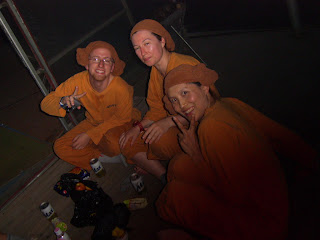First, an open letter to the Korean Government:
Korean Government:
Most of the wealthy nations on Earth found their way there through exploitation and protectionism. The European powers and their colonies, America and its taxes and thievery. (America did not join the Berne Convention against intellectual piracy until they--blush--we-- stood more to lose from Chinese piracy than to gain from pirating European works.) Japan through its exploitation of you and others.
Your protectionistic taxes are legendary, even among your own people. The US has called in the WTO to see you tax beer and diluted soju equally, and right they are that you are favoring one beverage over the other, by rates of almost 80%.
But I did not acquire a taste for the cheap stuff to see its price raised! Fight to the bitter end! (Or lower the damn taxes on Bourbon and Scotch, already. Actually maybe that's a better ... no you won't do that, nevermind.)
Sincerely,
Me.
***
Second, an explanation:
If you've been in Korea more than a few minutes, you've probably noticed the price discrepancy between the ubiquitous soju (the cheap stuff, not the traditional drink) and beer. Beer: over 1000 won/can, domestic, over 3000won/bottle, imported (one "standard drink"). Soju: about 1000 won/bottle (6 "standard drinks").
(For information on "standard drinks": http://pubs.niaaa.nih.gov/publications/Practitioner/pocketguide/pocket_guide2.htm)
If you've been in Korea more than a day, you've probably tasted soju, out of curiousity and the desire to save, and likely been appalled. If you've been here a few months, you may have acquired a taste. Or, as a friend of mine put it when asked if he liked soju: "I like to be drunk." (Notice flavor is not mentioned.)
The price difference--Why?
History and taxes.
The cheap stuff came about just after the war. According to Wikipedia (look, this is a blog, not academia, okay?), the Korean government prohibited distilllation from rice to alleviate food shortages resulting from the ravagings of the war. (http://en.wikipedia.org/wiki/Soju.)
But according to scholars at American University (please ignore the name, it actually is a decent university), this was more of a "leftover" from Japanese colonialism than an action by the postwar government. (http://www1.american.edu/TED/soju.htm, section 2, paragraphs 3-4.)
The Japanese controlled brewing and only licensed to certain supporters, yet somehow soju slipped through the cracks ... the cite I give is not at all clear on why or how and I invite anyone to add to this discussion.
My well-educated friend Kim who, though he does not know the word for wedgie, see http://taegukilchang.blogspot.com/search/label/language%20barrier, is quite smart, has told me an anecdote: The Japanese government allowed and encouraged certain alcohol to slip through the cracks to encourage drunkenness, and thus complacency, among the occupied people. This explanation makes particular sense when you consider that the name, even, is similar to a similar Japanese product, shochu. (http://en.wikipedia.org/wiki/Sh%C5%8Dch%C5%AB. I wouldn't do it in a paper but it's a blog, forgive me.) Given the numerous historical cultural exchanges between Korea and Japan this evidence isn't much, but it's enough for me to believe Kim and type a bit more.
Point is, soju was cheap and people drank it.
Now as you might now if you've ever encountered people and taxes, people don't like taxes on things they do. They like taxes on things other people do. Tax the wrong thing and you've got an uprising, regardless of the logic or justification.
So if everybody drinks soju, do you tax it? Not unless you want a revolution. But what about those western liquours favored by the rich under Japanese rule and the kids today? Tax 'em to death. 100%. No joke.
This is where the WTO steps in. Soju is cheap because its tax rate is closer to 20%. The US complains to the WTO that the preferential taxation is economic protectionism, which it is in actuality--there isn't any soju importation going on in Korea. And the WTO has since ordered Korea to bring its taxes in line, which the government is (slowly) doing.
So beware, soju drinkers. Soon that green bottle of poison may cost nearly $2.
Cites:
http://www1.american.edu/TED/soju.htm
http://en.wikipedia.org/wiki/Soju
http://en.wikipedia.org/wiki/Sh%C5%8Dch%C5%AB
http://pubs.niaaa.nih.gov/publications/Practitioner/pocketguide/pocket_guide2.htm
